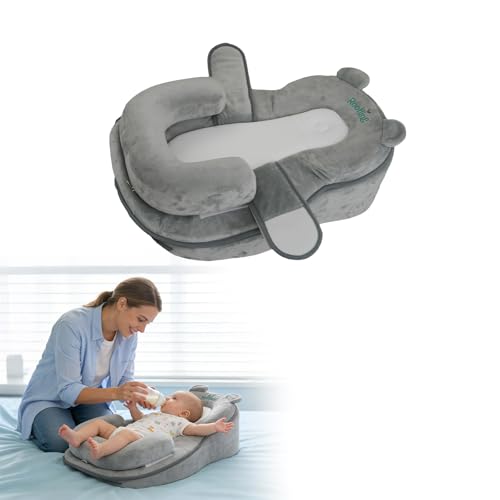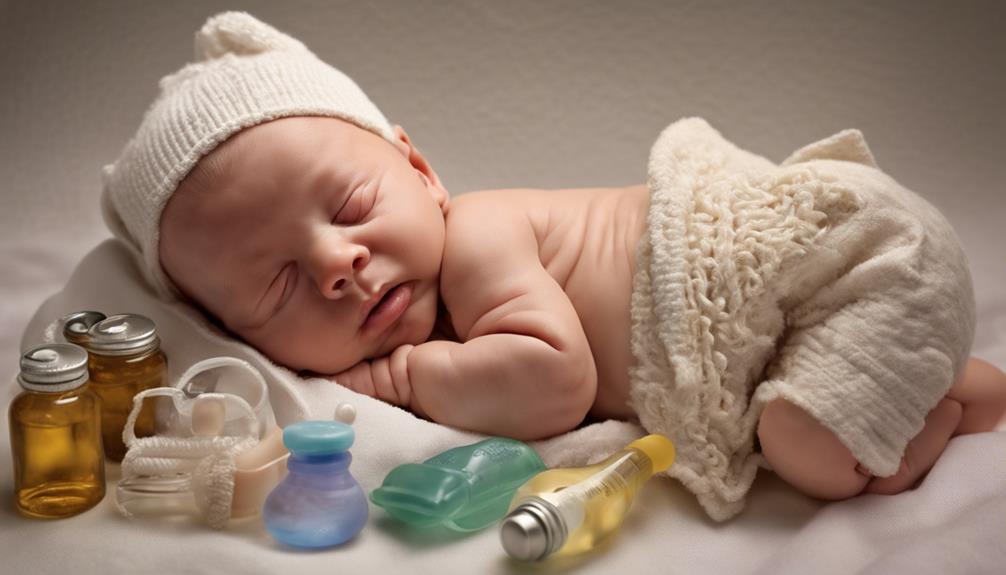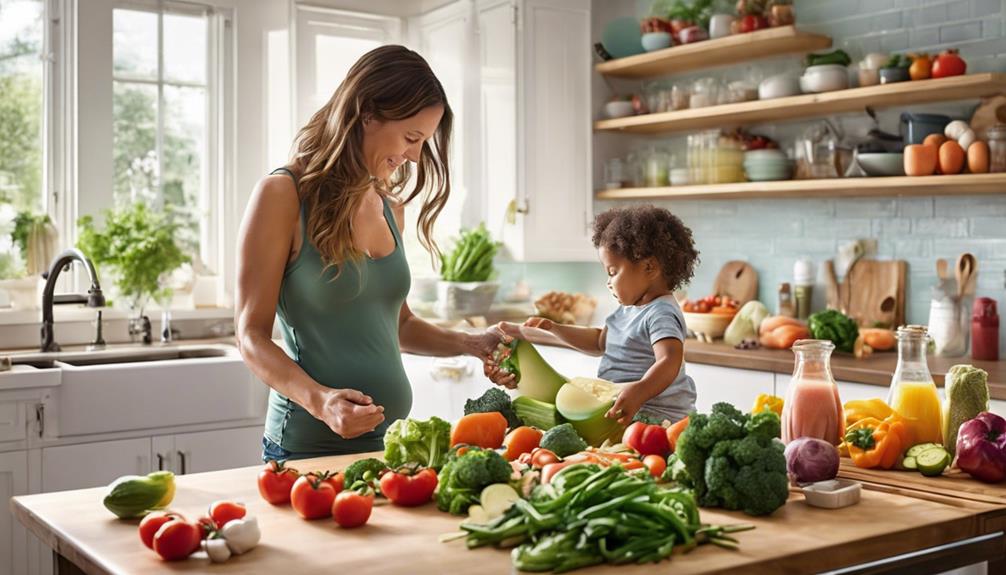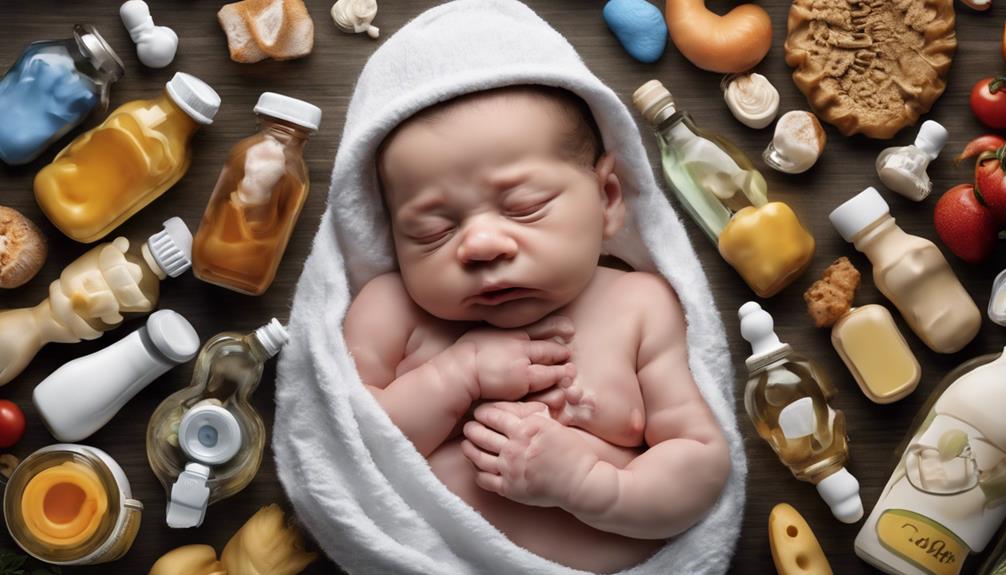When your newborn starts getting hiccups after every feeding, it can be a puzzling experience for parents. However, understanding the underlying reasons behind this common occurrence can provide you with valuable insights into your baby's well-being.
Knowing how to differentiate between harmless hiccups and potentially concerning ones is important for ensuring your little one's comfort and health.
Stay tuned to discover effective strategies for managing and preventing these hiccups, offering you peace of mind as you navigate through this phase of your baby's development.
Key Takeaways
- Newborn hiccups post-feeding are normal for diaphragm development.
- Causes include air swallowing, reflux, and diaphragm muscle spasms.
- Alleviate hiccups with burping, small feedings, and upright positioning.
- Consult a healthcare provider if hiccups persist or cause distress.

Comfy Cubs Muslin Burp Cloths 20" x 10", Pack of 10 – Large, 6-Layer, Ultra Absorbent 100% Cotton for Baby Drool and Messes – Soft, Safe & Gentle Baby Burp Cloths for Boys & Girls – Multi
Soft and Gentle Baby Burp Cloths: Made from 100% breathable muslin cotton, these burping cloths are lightweight, gentle,…
As an affiliate, we earn on qualifying purchases.
As an affiliate, we earn on qualifying purchases.
Understanding Newborn Hiccups
Newborn hiccups, a common occurrence after feedings, may seem concerning but are typically harmless and even beneficial for your baby's development. These little spasms are part of your newborn's normal bodily functions and can be linked to important aspects like brain development and self-regulation.
While it might worry you to see your baby hiccup so frequently, especially after feeding, rest assured that this is a common phenomenon in newborns. Causes for these hiccups range from swallowing air while feeding to issues like reflux, sudden temperature changes, or even slight irritation in the diaphragm or throat.
Surprisingly, these hiccups can actually help in strengthening the diaphragm, regulating breathing, and indicating a healthy nervous system. So, next time your baby hiccups after a meal, remember that it's just their body's way of growing and developing.

MYLICON Infants Gas Relief Drops for Infants and Babies, Dye Free Formula, 1 Fluid Ounce
Mylicon, the #1 pediatrician recommended brand, has been providing safe, effective relief of infant gas for generations
As an affiliate, we earn on qualifying purchases.
As an affiliate, we earn on qualifying purchases.
Causes of Baby Hiccups
If you've ever wondered what exactly causes those adorable little hiccups in your baby, you'll be interested to know that several factors can contribute to this common phenomenon. Baby hiccups can occur when your little one swallows air during feedings, creating air pockets in the stomach.
Additionally, the immature nervous system of babies can trigger the reflex pathway responsible for hiccups, leading to their frequent occurrence. The spasms of the diaphragm muscle, which are common in newborns and infants, can also result in those cute but sometimes bothersome hiccups after feeding.
Stomach pressure, whether from overfeeding or rapid feedings, is another common cause of hiccups in babies. Moreover, gastroesophageal reflux disease (GERD) can contribute to the frequency of hiccups after feeding. Being aware of these potential causes can help you better understand and address your baby's hiccups.

XFaa Rootling Baby Feeding Pillow, Anti Overflow Feeding Pillow for Reducing Spit-Up, Safety Nursing Pillow, Baby Lounger Reflux Wedge Breastfeeding, Removable top and Bottom (Gray, Small)
【Dual-Function Detachable Design】: The removable wedge segment transforms this pillow into a flat surface when detached. Perfect for…
As an affiliate, we earn on qualifying purchases.
As an affiliate, we earn on qualifying purchases.
Alleviating Baby Hiccups
To help alleviate your baby's hiccups, it's important to implement strategies such as burping during and after feedings to release trapped air. Here are some additional techniques to help stop your baby from hiccuping:
- Feeding in Smaller Amounts: Providing your baby with smaller, more frequent feedings can prevent overfeeding and reduce the likelihood of hiccups.
- Keeping Baby Upright: Holding your baby upright after feeding can aid in digestion and help prevent hiccups.
- Ensuring Proper Latch: Whether bottle feeding or breastfeeding, ensuring a proper latch can help prevent hiccups by reducing the intake of air during feeding.
- Feeding Calmly: Avoid fast feeding and create a calm, relaxed feeding environment for your baby to help prevent hiccups after feeding.

Ingenuity Baby Base 2-in-1 Booster Feeding and Floor Seat with Self-Storing Tray – Cashmere
To assemble the Ingenuity Baby Base, remove the tray, turn seat over and remove the seat back from…
As an affiliate, we earn on qualifying purchases.
As an affiliate, we earn on qualifying purchases.
Preventing Infant Hiccups

Implementing simple feeding and holding techniques can effectively prevent infant hiccups and promote your baby's comfort and well-being. To stop hiccups in your baby, remember to burp them frequently during and after feedings. This helps release any trapped air that could lead to hiccups. Consider feeding smaller amounts more frequently to reduce the chances of hiccups occurring in newborns.
Ensuring a significant latch during breastfeeding and using the correct bottle nipple size are essential in preventing infant hiccups. Avoid overfeeding and fast feeding, as these factors can contribute to hiccups in babies. After feeding, hold your baby upright for a little while to aid digestion and minimize hiccups. Keeping your baby calm during feeds can also help prevent hiccups.
Seeking Medical Advice

When your newborn's hiccups persist for hours after every feeding, reaching out to a healthcare provider is recommended. Persistent hiccups can be distressing for both you and your baby, impacting their comfort and well-being. Seeking medical advice is vital in such situations as it can help identify any underlying issues causing the prolonged hiccups.
Here are some key points to keep in mind when seeking medical attention for your baby's hiccups:
- Observing Distress: If your baby appears uncomfortable or distressed due to frequent hiccups after feedings, it's essential to consult a healthcare provider.
- Monitoring Feeding Patterns: Consult a doctor if your baby's hiccups affect their feeding patterns, as this could indicate a need for medical intervention.
- Ensuring Quality of Sleep: Prolonged hiccups after each feeding can disrupt your baby's sleep, impacting their overall health. Seeking medical advice can help address this issue.
- Identifying Underlying Issues: If your newborn's hiccups persist and interfere with their ability to feed properly, it's important to seek professional guidance to address any potential underlying problems effectively.
Frequently Asked Questions
Should I Be Concerned if My Newborn Gets Hiccups After Every Feeding?
You shouldn't worry if your newborn gets hiccups after each feeding. It's common and usually harmless. Just make sure they feed calmly to prevent swallowing air. If they're growing well and content, those hiccups are likely no cause for alarm.
Why Does My Baby Get Hiccups Every Time After Eating?
When your baby gets hiccups after eating, it could be due to fast feeding or swallowing air. Try feeding in a more upright position and remember, baby hiccups after meals are usually harmless and tend to decrease with time.
How to Get Rid of Hiccups in Infant Infant Hiccups After Every Feeding?
Feeling frustrated when your baby gets hiccups after each feeding? Try burping during and after, feeding smaller amounts frequently, holding upright post-feeding, adjusting nipple flow, and ensuring a proper latch. These simple steps can help.
Does Newborn Hiccups Mean Overfeeding?
Newborn hiccups don't always signal overfeeding. Many factors, like an immature digestive system, can trigger them. Watch for signs like weight gain and contentment to understand if it's related. Managing hiccups is key.
Conclusion
To sum up, understanding, alleviating, and preventing newborn hiccups is essential for ensuring your baby's comfort and well-being.
By addressing the causes and implementing simple techniques, such as burping and adjusting feeding positions, you can help ease your little one's discomfort.
Remember, seeking medical advice if hiccups persist is always a good idea. Trust your instincts as a parent and take proactive steps to keep your baby happy and healthy.









